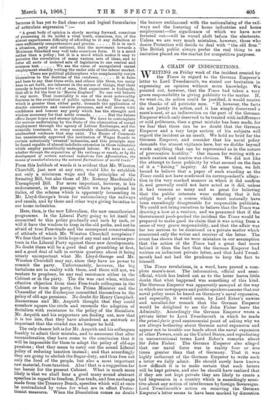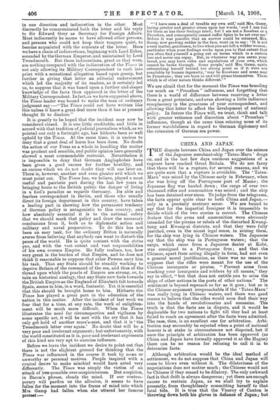A CHAIN OF INDISCRETIONS.
WRITING on Friday week of the incident created by the Times in regard to the German Emperor's letter to Lord Tweedmouth, we stated our hesitation in expressing an opinion without more knowledge. We pointed out, however, that the Times had taken a very grave responsibility iu giving publicity to the matter. If, we went on, its action could be justified, it would receive the thanks of all patriotic men. " If, however, the facts do not justify its action, and it has simply discovered a mare's-nest, or as indiscretion on the part of the German Emperor which only deserved to be treated with indifference or cold politeness, then a great mistake has been made, for we fear that there can be no doubt that the German Emperor and a. very large section of his subjects will regard the incident as an insult. We hold no brief for the German Emperor, and consider that his naval policy demands the utmost vigilance here, but we dislike beyond words anything that can be represented as in the nature of provocative hostility." Our reason for writing with so much caution and reserve was obvious. We did not like the attempt to force publicity by what seemed on the face of it a " fishing " inquiry. At the same time, we felt bound to believe that a paper of such standing as the Times could not have confirmed its correspondent's allega- tion in the very marked manner in which it did confirm it, and generally could not have acted as it did, unless it had reasons so many and so great • for believing that the public .interests were suffering that it felt obliged to adopt a course which must naturally have been exceedingly disagreeable for responsible publicists. We could not bring ourselves to believe that the Times was drawing a bow at a venture, and we presumed that if the Government pooh-poohed the incident the Times would-be prepared to make good its claim that it was acting from a sense of very grave responsibility, and that the affair was far too serious to be dismissed as a private matter which concerned only the writer and receiver of the letter. The event has shown that we were mistaken in our assumption that the action of the Times had a great deal more behind it than the fact that the German Emperor had written an indiscreet private letter, and that Lord Tweed- mouth had not had the prudence to keep the fact to himself.
The Times revelations, in a word, have proved a com- plete mare's-nest. The information, official and semi- official, which has leaked out as to the letter leaves little doubt that what happened was something of this kind. 'The German Emperor was apparently annoyed at the way in which our newspapers and public speakers assume that our naval policy must bo based on Germany's naval expansion, and especially, it would seem, by Lord Esher's unwise and uncalled-for remark that the German Emperor would be delighted to see Sir John Fisher leave the Admiralty. Accordingly the German Emperor wrote a private letter to Lord Tweedmouth in which he made the prima-facie good controversial point of asking why we are always bothering about German naval expansion and appear not to trouble our heads about the naval expansion of other Powers, such as the United States, and repudiating in unconventional terms Lord Esher's remarks about Sir John Fisher. The German Emperor also alleged that our naval force was in reality four or five times greater than that of Germany. That it, was highly indiscreet of the German Emperor to ,write such a letter we fully admit. He should surely have known how difficult it is to make certain that such letters will be kept private, and also he should have realised that if they are not kept private they are likely to create a bad impression in a country which is exceedingly sensi- tive about any notion of interference by foreign-Sovereigns. Lord Tweedinouth's action on receiving the German Emperor's letter seems to have been marked by discretion in one direction and indiscretion in the other. Most discreetly he communicated both the letter and his reply to Sir Edward Grey as Secretary for Foreign Affairs. Most indiscreetly he seems to have allowed other persons, and persons who could not keep their tongues quiet, to become acquainted with the contents of the letter. Here we have a chain of indiscretions, beginning with Lord Esher, seconded by the German Emperor, and maintained by Lord Tweedmouth. But these indiscretions, great as they were, are nothing compared with the indiscretion of the Times in not only allowing its Military Correspondent to rush into print with a sensational allegation based upon gossip, but further in giving that letter an editorial endorsement which led the majority of its readers, as it certainly led us, to suppose that it was based upon a further and deeper knowledge of the facts than appeared in the letter of the Military Correspondent. In fact, as we have suggested above, the Times leader was bound to make the man of ordinary judgment say :—" The Times could not have written like this unless it knew a great deal more than it has at present thought fit to disclose."
It is greatly to be hoped that the incident may now be considered closed. It is one little creditable, and little in accord with that tradition of judicial journalism which, as we pointed out only a fortnight ago, has hitherto been so well upheld by the Times. At the same time, it is useless to deny that a great deal of harm has been done. No doubt the action of our Press as a whole in handling the matter was prudent and sensible, and public opinion here generally showed a most commendable restraint. Nevertheless it is impossible to deny that German Anglophobes have been given a good excuse for further hostility, and an excuse which we do not doubt they will use later on. There is, however, another and even greater evil which we must point out. The Times has, we believe, played a most useful and patriotic part during the last few years in bringing home to the British public the danger of living in a fool's paradise as regards Germany. Its able and fearless correspondent in Berlin, and those who usually direct its foreign department in this country, have taken a leading part in showing how the permanent tendency of German policy is antagonistic to this country, and how absolutely essential it is to the national safety that we should mark that policy and draw the necessary conclusions from it, both as to diplomatic action and military and naval preparation. To do this has not been an easy task, for the ordinary Briton is naturally averse from believing that anybody can want to disturb the peace of the world. He is quite content with the status quo, and with the vast extent and vast responsibilities of his own oversea Empire. He fully realises, too, how very great is the burden of that Empire, and he does not think it reasonable to suppose that other Powers envy him his task. That any State should be steadily working to deprive Britain of the command of the sea, and thus of the thread upon which the pearls of. Empire are strung, or, to take an historical analogy, that any State now feels towards the British Empire as the England of Elizabeth felt towards Spain, seems to him, in a word, fantastic. Yet it is essential that this should be brought home to him. Hitherto the Times has played a great part in the education of the nation in this matter. After the incident of last week we fear that for a time, at any rate, the work of enlighten- ment will be much more difficult. When the Times illustrates the need for circumspection and vigilance by some specific act, it will be met with the cry that it has only got hold of another mare's-nest, and that it is the Tweedmouth letter over again.' No doubt that will be a very poor and irrelevant argument ; but unfortunately, with the world constituted as it is, poor and irrelevant arguments of this kind are very apt to exercise influence.
Before we leave the incident we desire to point out that there is not the slightest ground for thinking that the Times was influenced in the course it took by mean or unworthy or personal motives. People inspired with a cynical desire to make mischief would have acted very differently. The Times was simply the victim of an attack of irresponsible over-suspiciousness. But suspicion, in Bacon's phrase, clouds the mind. If our contem- porary will pardon us the allusion, it seems to have fallen for the moment into the frame of mind into which Mrs. Gamp had fallen when she uttered her famous protest ;— " 'I have seen a deal of trouble my own self.' said Mrs. Gamp, laying greater and greater stress upon her words, and I can feel for them as has their feelings tried; but I am not a B,00shan or a Prooshan, and consequently cannot suffer Spies to be set over me.' Before it was possible that an answer could be returned, Mrs. Gamp, now growing redder in the face, went on to say : It is not a easy matter, gentlemen, to live when you are left a widder woman; particular when your feelings works upon you to that extent that you often find yourself a going out on terms which is a certain loss and never can repay. But, in whatever way you earns your bread, you may have rules and regulations of your own, which cannot be broke through. Some people,' said Mrs. Gamp, again entrenching herself behind her strong point as if it were not assailable by human ingenuity, 'may be Rooshans and some may be Prooshans ; they are born so and will please themselves. Them which is of other naturs thinks different'" We are afraid that for the moment the Times was brooding too much on "Prooshan " influences, and forgetting that there is a world of difference. between receiving a letter from a great potentate, and even showing a little indiscreet complacency in the greatness of your correspondent, and allowing that letter to affect the development of national policy. In future the Times will, we trust, think and talk with greater reticence and discretion about " Prooshan " influences, though at the same time relaxing none of its former watchfulness in regard to German diplomacy and the extension of German sea power.











































 Previous page
Previous page